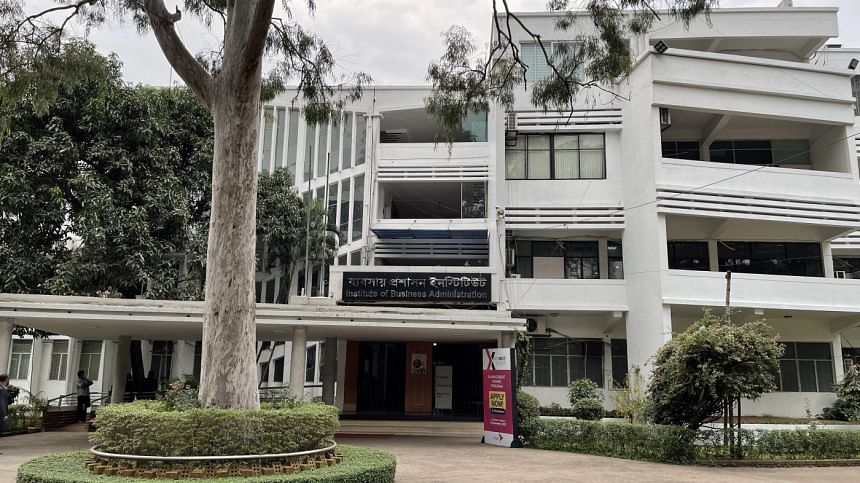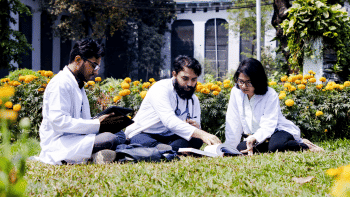What it takes to get into IBA, DU

[Note: This article was published in 2023. It does not take into account any recent changes in the admission requirements or test format.]
When I look around my class at the Institute of Business Administration (IBA), Dhaka University (DU), I see people with diverse admission journeys.
Some of them, like my friend Abdullah Al Faiaz, prepared only for the IBA entrance exam. Some, like me, wanted to play things safe and made sure we secured seats elsewhere like in DU's D-unit. Many went through the brunt of engineering admission tests before they started preparing for IBA. Then there's another bunch who didn't prepare for IBA at all but still managed to ace the admission test.
With the admission test being extremely competitive and the question pattern different from most other public admission tests, students are often left asking what it really takes to get into IBA, DU.
Based on my own experience and that of the people around me, here are some factors that can impact your odds of getting in.
Science, Commerce, and Arts – does it matter?
The IBA admission exam is basically an aptitude test. The exam topics – Math, English, and Analytical Ability – are not derived from any of the National Curriculum and Textbook Board (NCTB) curriculums. Instead, they focus on a student's core mathematical, language, and analytical skills. Hence, students from all backgrounds (Science, Arts, and Commerce) can apply and have an equal chance.
In practice, an overwhelming number of IBA students come from a Science background. Since science subjects tend to be comparatively math-heavy, there is a gap that exists between the mathematical skills of the average student in science and those in other curricula. Given the competitive nature of the exam, students who haven't taken many quantitative subjects in the past few years should put in some extra effort to get comfortable in working with numbers. Being fast is particularly important because it helps tackle the biggest challenge in the IBA admission test.
The time constraint
Students get 90 minutes to answer around 75 MCQs followed by 30 minutes of descriptive writing. This leaves them with one minute for each question. But many of these questions, especially some from maths and analytical ability, will take longer. A common fix to this problem is being quicker in the English section to invest more time in the other two.
Having a plan about the order in which you will approach the section is important. Start with the subject you're most comfortable with and then get into the more difficult ones. Ample time should be allocated for all three sections as each of them need to be passed separately.
The passing bar differs yearly according to the difficulty level of the entrance exam.
Negative marks
For every wrong answer, 0.2 is deducted from your total obtained marks. So, avoid marking a question unless you're sure about it. However, educated guessing – used in moderation – can help elevate your score.
Practice
Practice will help you increase your speed and accuracy. It will also help recognise your mistake patterns and you can learn to minimise errors.
Sitting for mock exams is important. In addition to the MCQ sections, consider including the descriptive writing part in your mock exams. It will teach you to be more organised in the writing section.
Vocabulary
Being able to answer vocabulary-related questions correctly gives you confidence. Since these require less thinking compared to the other question types, time is freed up to be invested elsewhere.
Rote memorisation of word meanings won't be useful. The questions are designed to test your knowledge of not only the meaning of the words but also their correct usage. This makes it important to be more involved with the new words you're learning. Constructing sentences with these words is a practice I and many others included in our IBA admission study routine.
The psychological aspect
One question most of my mentors used to ask me was, "What other places are you trying for besides IBA?" This question is built upon layers of societal and psychological realities. We tend to put a premium on certain institutions, which makes the IBA, DU admission test a high-stake situation. Stakes tend to be higher if you have invested all your time and effort into this one exam. The pressure to get in increases and can negatively impact your performance during the admission test.
Since the IBA, DU entrance exam takes place late in the admission phase, securing a place in some other university you might want to study in helps in being more confident going into the IBA admission test.
The secret ingredient
Despite all your efforts to increase the odds of getting into IBA, the odds can choose to not be in your favour. And there's nothing you can do about it.
So, besides a great deal of preparation, you need a bit of luck too.
Noushin Nuri is an early bird fighting the world to maintain her sleep schedule. Reach her at [email protected]

 For all latest news, follow The Daily Star's Google News channel.
For all latest news, follow The Daily Star's Google News channel. 










Comments